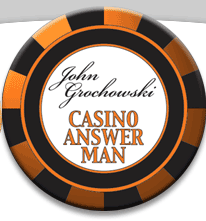In any casino game, there are myths and legends, things people believe that don't quite square with reality. Let's take on a few myths from a table games
player perspective.
MYTH: The third baseman is a team player, and shouldn't take the
dealer's bust card. A third baseman hitting 12 when the dealer has a 2,
for example, is hurting the entire table.
FACT: A player hitting in that situation helps the rest of the table
as often as he hurts it. Anyway, it's the best play for his hand.
Hitting 12 against 2 is what he SHOULD do.
Wouldn't it be nice if we knew whether or not the next card in the
deck would make the dealer's hand go bust? Problem is, we don't know
what the dealer has face down, and we don't know what the next card is.
Sitting at third base, I've drawn a 9 to my 12 for a 21, had the dealer
turn up a 10-value card, then draw another 10 to bust. The entire table
won, but if I hadn't hit, the dealer would have had a 9 and the whole
table would have lost.
I've also drawn a card that would have busted the dealer. Most often,
though, the dealer has something less than a 10-value face down, and NO
one-card draw can bust the dealer's hand.
Unless other players are willing to pay for losses, the third
baseman's responsibility is to make the play that's best for his or her
own hand.
MYTH: A hot craps table is likely to stay hot, a cold table is likely to stay cold.
FACT: Average results on a table after a hot streak are the same as
after a cold streak. Odds of the game don't change, regardless of how
hot or cold the shooters have bene.
Craps players are always looking for hot tables, and avoiding cold
ones. But unless you're dealing with controlled rollers, a la Frank
Scoblete and his Golden Touch Craps team, I've never really seen a
reason why a hot table should stay hot, or a cold table stay cold. We
are dealing with dice, after all, that don't know what the previous
results have been.
Several years ago, I put it to the test. For nearly a year, every
time I was in a casino in the Midwest, South and in Nevada, I stopped
by a craps table, waited until I saw two consecutive passes, then
tracked the result of the next decision -- not as good a sample as a
million-hand computer run, but a lot more time-consuming.
The result: Pass bettors won 489 wagers and lost 511 on the next
sequence after two consecutive wins. There was no tendency for the dice
to stay hot.
I also watched 1,000 trials that started with two don't passes, then
charted the next decision. The dice passed 496 times in those 1,000
trials a mere three more passes than the expected average. There was no
tendency for cold dice to stay cold, either.
Now, a thousand trials each way isn't enough to satisfy a
statistician, but if hot tables stay hot and cold tables stay cold,
well, you can't prove it by me.
MYTH: Just as in blackjack, counting cards can help you win.
FACT: Counting cards in baccarat doesn't help in any practical way.
Favorable situations in baccarat are really rare. The late Peter Griffin wrote in The Theory of Blackjack
that a baccarat player who doesn't bet unless he has an advantage can
squeeze an edge of about 0.7 percent of his maximum bets on banker and
player. However, that player might play only about three hands per eight
hours. That's watching, not playing.
For bets on ties, it's theoretically possible to count down to a 24
percent edge with six cards remaining, provided all the cards are dealt
out.
In the real world, nobody deals out all the cards, and with one-half
deck cut out of play, the bettor's potential edge on the last hand
shrinks to just 0.08 percent. With just a small reservation, we can say
the myth of the baccarat card counter is JUST a myth.
MYTH: An experienced roulette dealer can make the ball land where he pleases.
FACT: Dealers I know scoff at the notion they can hit a number at
will. With the wheel spinning one way, the ball going in the opposite
direction, bouncing on the surface and from fret to fret separating the
numbers, there are far too many physical variables for a dealer to
control where the ball will land.
Anyway, the last thing the casino wants is a dealer who can hit a
number at will. As long as the results are random, the casino makes its
money. However, if a dealer could control what numbers were coming up,
there'd be a chance someone would be in on the secret and take a lot of
money from the casino. Random games mean big profits for the operators.
Taking the randomness out increases operator risk.

Your blog is great. I just love reading it all
ReplyDeleteThanks, Scott, I appreciate the comment.
ReplyDelete